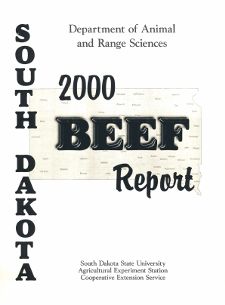Document Type
Report
Report Number
2000-2
Publication Date
2000
Keywords
stressed corn, feeding value, ear corn
Summary
Yield, Ib/acre, bushel weight (BD), Ib/bu, relative maturity (RELMAT), chemical composition and in vitro dry matter digestibility (IVDMD) were used to screen corn varieties In = 20) of varying maturities grown under the stress of a shortened growing season. Corn varieties were planted in late June of 1996. Whole shell corn (WSC) and ear corn (EC) were harvested. Bushel weight was quantified on WSC. Yields for WSC, and EC were 1941 + 706 and 2307 ± 997 Ib DM/acre, respectively. Whole shell corn and EC were sorted into yield (YGP) groups. Whole shell corn yields were 2942 ± 248, 2305 ± 138, and 1292 ± 343 Ib DM/acre for YGPI through YGP3, respectively. The EC yields were 3740 ± 207, 2980 ± 208, 1897 ± 235 and 1139 ± 455 Ib DM1 acre for YGP 1 through 4, respectively. For WSC, YGP 1, YGP 2 and YGP 3 produced 2529, 1956 and 1099 Ib TDN/ac, respectively. Ear corn YGP 1, YGP 2, YGP 3 and YGP 4 produced 2980, 2180, 1437 and 780 Ib of TDN/ac, respectively. Increased yield in corn varieties grown under the stress of a shortened growing season was attributed to an increase in starch content. Even so, digestibility and energy content were not related (P > .05) to yield or BD. Relative maturity did not influence (P > .05) chemical composition, digestibility or energy content. Results suggest that while selecting earlier maturing corn for short growing seasons improves yields, it gives no advantage to feed value. Bushel weight, yield or maturity date should not be used as single criteria when predicting feed value of corn grown under the stress of a shortened growing season.
Number of Pages
7
Format
application/pdf
Language
en
Publisher
South Dakota State University
Rights
Copyright © 2000 South Dakota State University
Recommended Citation
Cerkony, W. M.; Pritchard, R. H.; and Wicks, Z. W. III, "Evaluating the Agronomic Feasibility of Planting late Season Corn for Feedlot Cattle" (2000). South Dakota Beef Report, 2000. 3.
https://openprairie.sdstate.edu/sd_beefreport_2000/3

